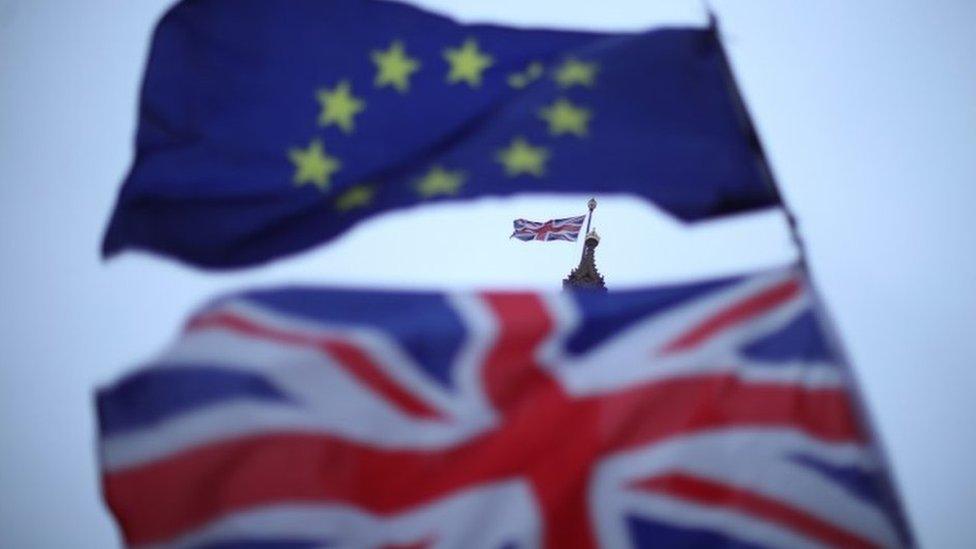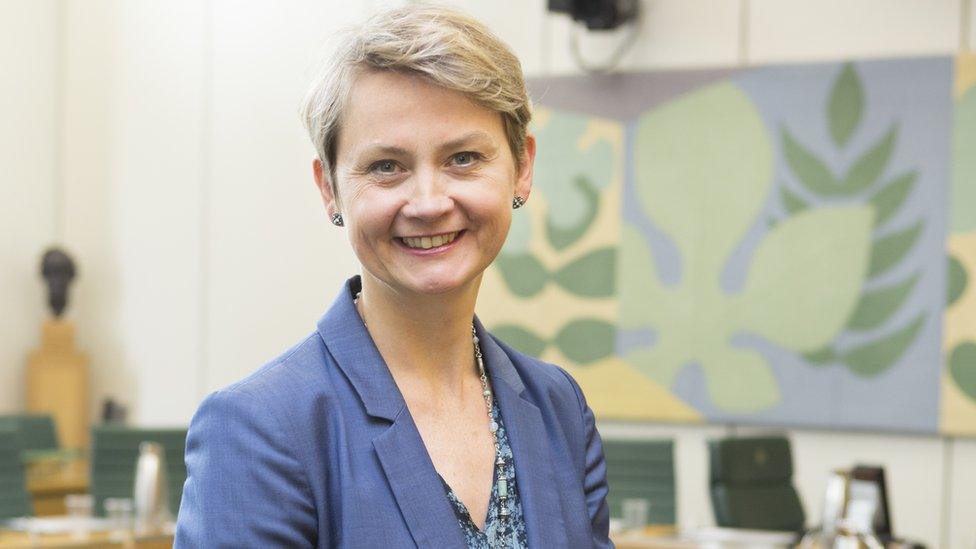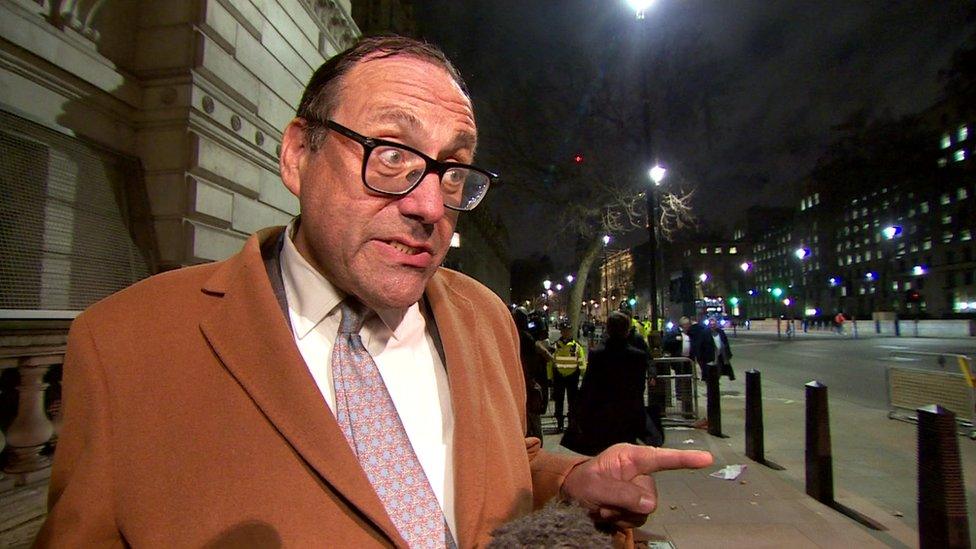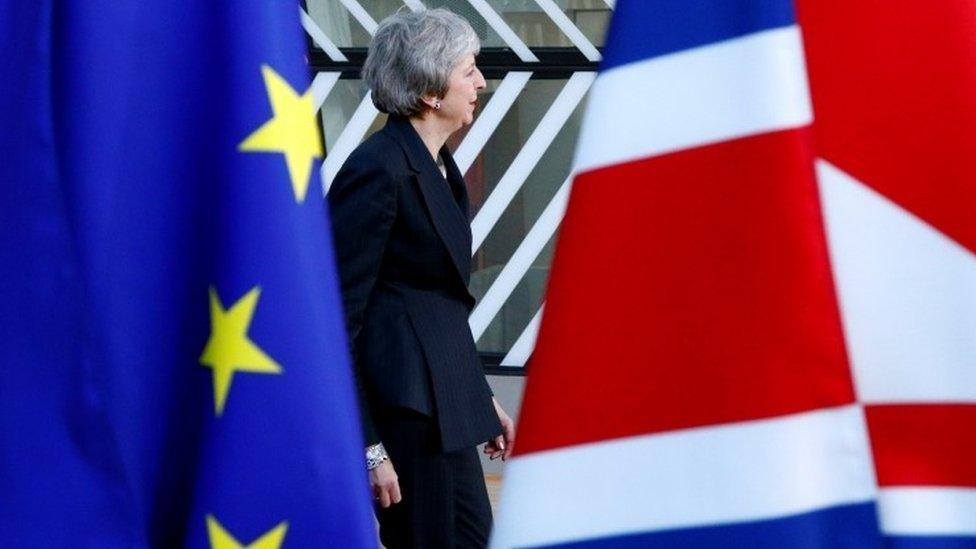Brexit: MPs try to limit government's no-deal financial powers
- Published
- comments

MPs who do not want the UK to leave the EU without a deal are trying to limit the government's financial powers in the event of a no-deal Brexit.
The House of Commons will vote shortly on a cross-party amendment to the Finance Bill, which enacts the Budget.
Several senior figures back the move, but International Trade Secretary Liam Fox called it "irresponsible".
No 10 said it would not stop tax being collected, describing the MPs' move as "more inconvenient than significant".
Downing Street said the amendment, which could be voted on about 19.00 BST, was "not desirable" and Mrs May was striving to get her deal through Parliament.
Meanwhile, minister Richard Harrington said he is prepared to resign to stop the possibility of a no-deal Brexit.
Mr Harrington suggested to BBC Newsnight that others might follow suit, saying his position was "not an uncommon one".
MPs will seek to turn the screw on ministers with Tuesday's amendment, which is intended to demonstrate to the government the strength of opposition to a no-deal Brexit in the Commons.
If passed, it would mean the government would not be able to raise certain taxes and take other financial steps arising from a no deal - unless Parliament had explicitly authorised the UK leaving the EU without a deal.
The UK is scheduled to leave the EU on 29 March whether there is a deal or not.
The deal which Prime Minister Theresa May has negotiated with the EU - which covers the terms of the UK's divorce and the framework of future relations with the EU - has not been formally approved.

Yvette Cooper says her amendment has support from Remain and Leave MPs
Labour MP Yvette Cooper who, along with Conservative Nicky Morgan, is behind the amendment, said Parliament must act now to rule out a no-deal Brexit in the event of Mrs May's agreement being voted down next week and MPs being unable to agree any other course of action before the UK's exit in March.
She told the BBC: "There is a risk that we end up with no deal by accident, as a result of brinkmanship, delays and drift.
"That's why Parliament has to be sensible and say 'we have to rule out the worst option, the kind of damaging deal that would hit manufacturing industry and would also put our police and security at risk as well".
Allow X content?
This article contains content provided by X. We ask for your permission before anything is loaded, as they may be using cookies and other technologies. You may want to read X’s cookie policy, external and privacy policy, external before accepting. To view this content choose ‘accept and continue’.
Labour have said they will back the amendment, prompting speculation that ministers will be forced to accept it in order to avoid a damaging defeat.
But Mr Fox, who backs Mrs May's deal, said it would be "irresponsible to tie the government's hands" at this stage by ruling out any options.
Speaking at a technology fair in California, Mr Fox said it would not take the possibility of a no-deal exit off the table.
"The government has to ensure that all eventualities are covered," he said. "It maybe that we cannot get agreement with the EU and that we have to leave without an agreement in which case the UK has to be prepared."
In other Brexit developments:
Brexit Secretary Stephen Barclay plays down reports of Article 50 being extended to allow for more negotiations
A new government website advising consumers and businesses what to do in a no deal situation will go live on Tuesday
German and Irish foreign ministers are to meet to try to find a "fix" for the Irish border backstop
MPs write to the head of the Met Police saying they have "serious concerns" about public order and security outside Parliament, after Tory MP Anna Soubry was verbally abused outside Parliament by pro-Brexit supporters
MPs will vote on 15 January on whether to accept the legally-binding terms of withdrawal negotiated by Mrs May, as well as a framework of future relations with the EU. Five days of debate in the Commons will begin on Wednesday.
The prime minister has said the UK will be in "uncharted territory" if the deal is not accepted although she has not ruled out asking the Commons to vote on it on several times prior to the 29 March deadline.
'PM's deal or no Brexit'
Mr Harrington, a minister in the business department, told Newsnight he was confident that Britain would leave the EU with a deal as the stark reality facing the UK became clear.
"We will not be leaving with no deal," he said. "I think people are beginning to realise that it's the prime minister's deal or there may not be a Brexit."

Richard Harrington said MPs had to choose between Mrs May's deal or no Brexit
Asked whether he was prepared to resign to stop a no-deal Brexit, he replied: "Definitely, I would... The prime minister knows everybody's views and I think my view is not an uncommon one."
Another minister, Margot James, suggested on Monday that Brexit may have to be delayed and negotiations extended under the Article 50 process if Parliament could not agree on the terms of withdrawal.
The vote on the cross-party amendment is expected at about 19:00 GMT.
Government sources warned over the weekend of "paralysis" and an effective "shutdown" if the Treasury was stripped of the power to pass regulations relating to "no-deal financial provisions" without parliamentary approval.
One leading tax expert said ministers would still be able to make tax changes by introducing new clauses into future Finance Bills or introducing emergency legislation but would find it much "more cumbersome".
"Even if the clause were passed and there was a no-deal Brexit, the system could still function," Andrew Hubbard, a consultant at audit, tax and consulting firm RSM said.
"But there is no doubt that if the clause were passed, it would represent a huge challenge to the authority of the government and increase further pressure to find a negotiated way out of the current deadlock."
- Published8 January 2019

- Published4 January 2019

- Published13 July 2020
